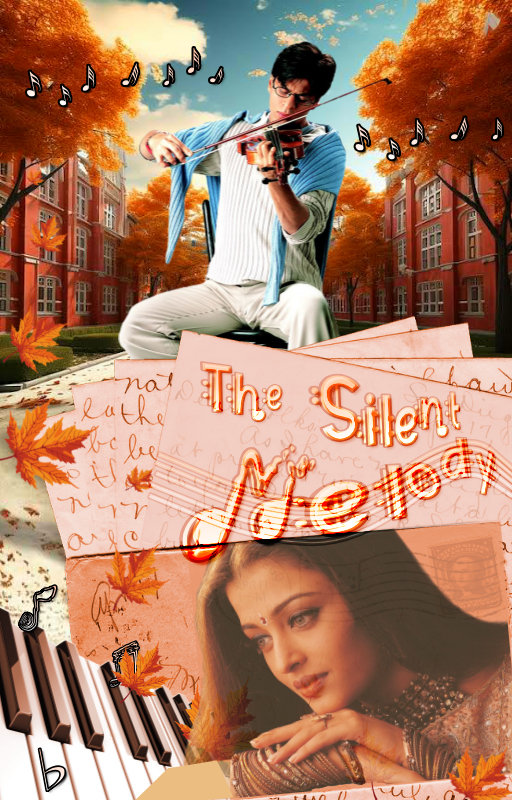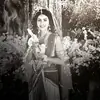The Silent Melody
Trope and setting: Secret love letters | 90s College
Characters: Raj Aryan from Mohabbatein & Nandini Darbar from Hum Dil De Chuke Sanam
Word count: 1186
Cover made by ssttuuttii
Winning entry of Khan-tastic Writing Contest

The gates of Gurukul opened slowly, their iron hinges crying out like memories refusing to rest. Raj Aryan stood still for a moment, violin case hanging from his shoulder, eyes tracing the ancient stone arches that seemed to hum with unspoken discipline.
He had come here to teach music — to awaken silence with sound. The morning breeze brushed against his face, and without thinking, his lips parted in a quiet hum:
Chalte chalte yunhi ruk jaata hoon main,
Baithe baithe kahin kho jaata hoon main,
Kehte kehte hi chup ho jaata hoon main…
The tune floated across the courtyard — delicate, searching — like it was looking for someone who could understand it.
Inside the classroom, he introduced himself gently. “I’m Raj Aryan. You can call me Sir Aryan,” he smiled, his voice warm, unhurried. The students greeted him politely, some shy, some curious. But one gaze held him still — large, deep eyes that seemed to carry stories she hadn’t yet told.
Her name was Nandini Darbar, a foreign student from London, newly arrived like him, but already belonging somehow.
*
In the weeks that followed, Raj learned what Gurukul truly was — not a college, but a kingdom ruled by silence. Its head, Narayan Shankar, was a man of stone — feared, revered, and untouched by emotion. Love was forbidden here; freedom, an illusion. No student could cross the gates. No laughter could echo after dusk.
Raj Aryan, who believed that music was love and love was worship, became an unexpected spark in this quiet prison. His classes felt alive — each note a small act of rebellion.
Nandini stayed behind after every session. Sometimes to learn, sometimes to listen, and sometimes… to simply exist in the same silence that his music filled.
She played the violin with grace, but her melodies carried sorrow — soft, haunting, incomplete. Raj often caught himself wondering, what pain hides behind that perfection?
And slowly, between the ragas and the pauses, between words unspoken and glances exchanged, something unnamed began to grow.
*
One morning, Raj opened his violin case to find a letter hidden inside.
Jo naam dil pe ho likha,
Ikraar usi se hota hai,
Kaise kahoon main o yaara,
Yeh pyaar kaise hota hai…
It was written in neat handwriting — a continuation of the tune he had been teaching. But behind it, another folded sheet lay waiting.
Your music reaches deeper than words ever could.
I wonder if you’d still play like this if you knew the truth about this place.
Yours, M.
He stared at the note for a long time. M? There were several students whose names began with that letter. Who could it be?
The letters didn’t stop. They found him everywhere — in the music room, in his books, under the violin bow. Each one stranger, more desperate.
There is a melody buried in Gurukul’s silence.
A girl died here. They called it suicide. It was not.
The final line in one letter read, Look in the principal’s office. You’ll find the truth.
Raj’s hands trembled as he read it. That evening, he showed the letters to Nandini.
She listened quietly, her expression unreadable. “A tragedy did happen here I heard,” she whispered. “Nobody speaks of it anymore. Narayan Shankar’s daughter — Megha Shankar. She was a music student. They said she jumped from her dorm window last year.”
“Megha…” Raj murmured. “M.”
But Megha was dead. So who was writing to him?
*
The letters grew more personal after that.
Your music makes me feel alive again.
I’m afraid to show myself. Will you trust me?
Raj began sharing every detail with Nandini. Together, they followed the trail of clues — the places the letters mentioned, the places where his music lingered.
They found the old auditorium where a piano still stood, its keys gathering dust yet holding faint echoes of a girl’s laughter. They walked to the balcony where Megha had fallen — the wind whispering mysterious secrets.
Finally, they reached Narayan Shankar’s office late one night. The air was heavy with incense and fear. Raj’s fingers searched through drawers and papers until they brushed against something hidden — a string tucked beneath a false bottom.
He pulled it out. A diary, wrapped in a delicate scarf.
He tells everyone I’m his daughter, but in private he torments me.
He curses my mother for leaving me with him.
When I said I’d tell the world, he said he would silence me forever.
He’s outside my room now. I can hear his footsteps.
The last entry ended mid-sentence. A few photographs slipped from between the pages — young girls, smiling faintly.
Raj’s chest tightened. “It was Narayan Shankar,” he whispered. “He killed her.”
Nandini’s eyes filled with tears. “Then it's time we end this silence.”
*
The night of Diwali arrived — the entire campus glowing with lamps, each flame flickering like a heartbeat. Narayan Shankar stood on the stage, his voice echoing across the hall, delivering his annual sermon on discipline and duty.
Before he could continue, Raj Aryan stepped forward. “Before we celebrate light,” he said, “there is darkness that must be heard.”
From the corner of the stage, a faint sound emerged — the soft press of piano keys. Nandini sat at the piano, its polished wood gleaming in the candlelight. Her fingers moved slowly at first, hesitant, trembling — then the melody unfurled, fragile and haunting. Megha’s melody.
The hall fell silent as the notes rose and lingered in the air. Each chord seemed to breathe, to ache, to confess.
Raj opened the diary and began to read aloud. Every word struck like thunder. Gasps erupted. Whispers turned to cries.
And then Raj saw Narayan Shankar’s face — pale, trembling, eyes fixed on Nandini as she turned around.
“Megha…” he breathed. “You’re dead… you can’t be here.”
Raj froze. “What did you just say?”
Narayan sank to his knees, shaking. “Forgive me… forgive me, Megha…”
The hall dissolved into chaos, but Raj could only stare at Nandini. Her face glowed softly in the lamplight.
“Thank you,” she said quietly. “You believed me when no one else did.”
He took a step forward, voice breaking. “Don’t go.”
Her eyes softened. “I must. My melody is complete now.”
She reached out her hand — and for a heartbeat, he felt her fingers brush his. Then she was gone. The piano keys stilled beneath empty air.
Only her music lingered, echoing through the hall long after the lights dimmed.
*
Days later, the gates of Gurukul opened for the first time in years. The truth spread like wildfire. Narayan Shankar was stripped of his post, and the walls that had once imprisoned hearts were broken forever.
Students began to sing freely again. Laughter filled the air like a forgotten song returning home.
Raj Aryan remained in the old auditorium, often sitting by the old piano, his violin resting beside him. Some evenings, when the wind passed through the open windows, he could swear he heard a faint tune — her tune — drifting through the corridors.
And every time it came, he smiled.
Because he knew now that love doesn’t die.
It transforms — into sound, into memory, into a melody that refuses to fade.





















 It was insightful and engaging.I felt as though I was there with the characters.
It was insightful and engaging.I felt as though I was there with the characters.

















5